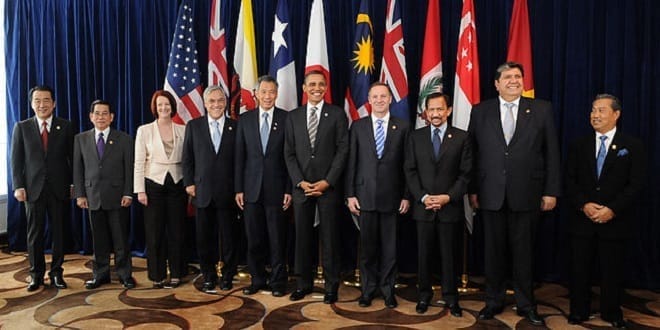The Trans-Pacific Partnership, which announced that it reached a final agreement a few days ago, has quickly drawn a large negative response, not just from activist groups but from prominent politicians as well. When the deal was announced, both Donald Trump and Bernie Sanders were quick to denounce the deal. Since they are considered the "anti-establishment" candidates in the race, opposition to the TPP seems natural. Sanders stated that he was "disappointed but not surprised by the decision to move forward on the disastrous Trans-Pacific Partnership trade agreement," adding that it will, "hurt consumers and cost American jobs." Trump tweeted out, "The incompetence of our current administration is beyond comprehension. TPP is a terrible deal."
Also joining the voices against the TPP is Hilary Clinton. Previously a supporter of the TPP as secretary of state, Clinton has had a change of heart. She stated that, "As of today, I am not in favor of what I have learned about it." Clinton has concerns about currency manipulation not being covered by the deal, and believes the deal may benefit pharmaceutical companies at the expense of patients. It's difficult to tell whether this is a genuine change of heart based on new information about the deal, or an opportunistic flip-flop, to benefit from the widespread discontent with the TPP.
The city of Miami has also spoken out against secretive trade deals. The city of Miami commissioners unanimously passed a resolution calling for greater transparency from the federal government regarding trade deals that could affect south Florida's economy. This resolution was made mere days before leaders from the United States and the European Union are scheduled to meet in Miami to discuss the Trans-Atlantic Trade and Investment Partnership.
The commissioners believe that both the TPP and the TTIP could have negative effects on jobs and wages. Like the TPP deal, the TTIP negotiations are shrouded in secrecy. Although the European nations have made their proposals for the deal available for their citizens to view, the American government has not published its own proposal. However, corporate lobbyists were given adviser status to view texts relating to the negotiations. The Miami commissioners believe that both deals should have greater transparency so all citizens can be informed about the nature of the deal, not just lobbyists.
In Canada as well the TPP has drawn some criticism. NDP party leader Thomas Muclair sated that the NDP would not be bound by any deal signed or negotiated by the Conservatives during the election, if they formed the government in 2 weeks. Previously, Mulcair had stated general support for a trade agreement with Pacific partners, but was concerned about some details of the TPP deal. He also observes that Prime Minister Stephen Harper is ignoring a longstanding convention in Canadian politics, that once an election is called the sitting government acts as a caretaker, merely managing the day-to-day administration without introducing major bills to parliament or negotiating major treaties. Harper's defiance of this conventions is seen by Mulcair as a justification to ignore the deal if elected.
Whether or not to ratify the deal is likely going to be a major political issue in both the US and Canada. Most of the political discussion of the deal is about the impacts of free trade, such as tariffs, protection removal and other parts. However very few politicians are discussing the numerous other aspects of the deal. Clinton's comment about pharmaceutical companies shows some concern over the deal's provisions relating to patents. However, there is almost no discussion by any politician on the ramifications the deal would have on copyright, trade secrets, DRM circumvention and other issues raised by activist groups like the EFF. These issues are likely to be sidelined during the elections in favor of a debate over free trade.
Do you think Congress will ratify the TPP, or will the opposition to it be enough to stop it? Leave your comments below.







